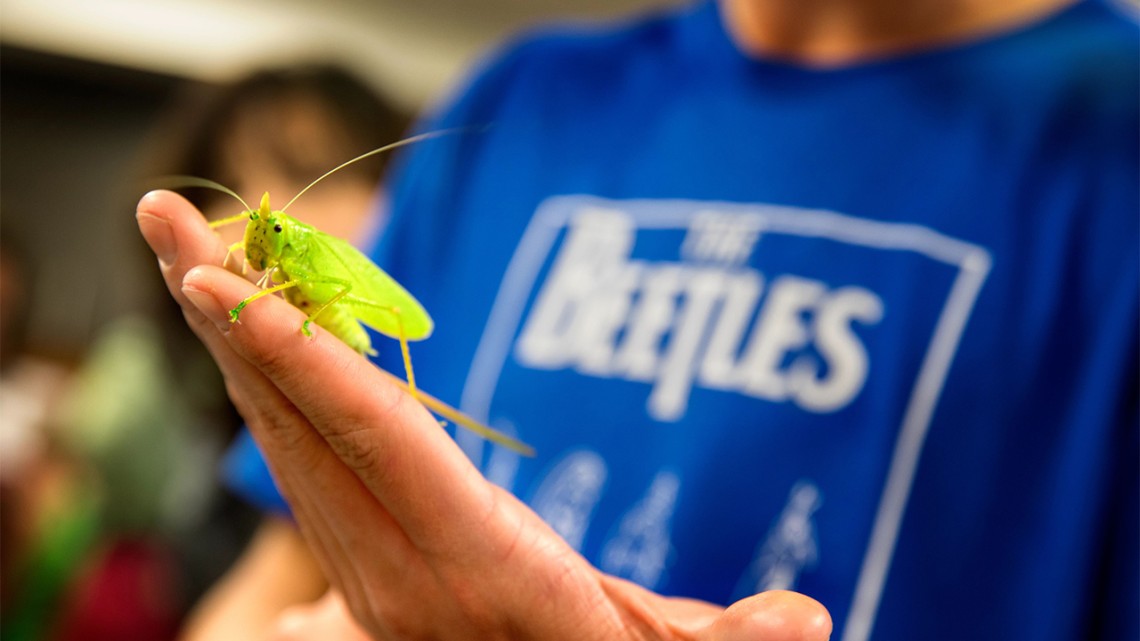
The 17th annual Insectapalooza festival is scheduled for Oct. 22 from 9 a.m. to 3 p.m. in Stocking Hall.
After two-year hiatus, Insectapalooza is ‘Glad to Bee Back’
By Laura Gallup, Cornell Chronicle
Cornell entomology students and faculty are pulling out all the stops, including a room of about 100 free-flying butterflies, for the 17th annual Insectapalooza festival in Stocking Hall.
On Oct. 22 from 9 a.m. to 3 p.m., all ages are invited to visit exhibits and hands-on activities highlighting how insects interact with the world and humans, for better or worse. Hundreds of species of arthropods will be on display, including live beetles, walking sticks, spiders and bees, as well as a plethora of preserved bugs from the Cornell University Insect Collection.
“Insectapalooza is designed to share what’s interesting about entomological science, or insect biology, with the public,” said Linda Rayor, senior lecturer and senior research associate in the Department of Entomology in the College of Agriculture and Life Sciences. “They’re fun and they’re cool, and they’re charismatic. And we’re doing really hot science here and are happy to communicate that in an accessible way.”
A spider expert, Rayor teaches a Naturalist Outreach Practicum course, which shows students how to do effective science outreach. Her students will practice their skills at the festival by talking about the insects on display and inspiring the youth who visit.
This year’s theme, Glad to Bee Back, refers to the festival’s return after having been cancelled in 2020 and 2021 due to the COVID-19 pandemic.
For the first time, the event will have a crossover exhibit with the Cornell Lab of Ornithology exploring how bird predators have shaped spider behavior and anatomy. The exhibit will feature live spiders and bird specimens, where visitors can guess which type of bird eats the most arachnids.
As bird and spider populations decline, it’s becoming more important to highlight the ways in which they are intertwined, said Chelsea Benson, public programs coordinator for the Cornell Lab of Ornithology.
“Ruby-throated Hummingbirds hover and pluck spiders and their prey from webs and use those very webs to build stretchy lichen-covered nests,” Benson said. “Tree Swallows maneuver through the air to catch spiders as they ‘balloon’ across an open space. And some spider species have evolved to look like bird droppings to avoid predation. There are many amazing connections.”
Also new this year are 30-minute workshops designed for older teens and adults who want to dive deeper into topics such as spotted lanternflies, monarchs and ticks.
Cole Gilbert, director of undergraduate studies in the Department of Entomology, is holding a session that will explore careers in entomology.
“Young people with a strong interest in insects may only see research professors, pest control folks or beekeepers as career options,” said Gilbert. “Those are indeed entomological careers, but there are so many more to be aware of. I hope to reveal a much broader range of possibilities to enjoy working with insects and get paid for it.”
Rayor, who has helped organize the event since its inception, said they expect 1,500-2,500 visitors this year.
While the event is mostly aimed at residents in the local community, each year pulls in a few excited young people from neighboring states, hoping to eventually get a job in the bug world.
“For the older teens, I think this is what’s exceptional: showing them that in fact, there are real careers.” Rayor said. “If you like bugs, you can actually earn a living doing it.”
Insectapalooza is also a “wonderful” recruitment tool for the Department of Entomology, Rayor said. “Many of the students who ultimately decide to come to Cornell come here as teenagers and say, ‘Man, these are my people.’”
Parking and entrance to the event are free and the Cornell Dairy Bar will be open for snacks and beverages throughout the day.
Media Contact
Get Cornell news delivered right to your inbox.
Subscribe
